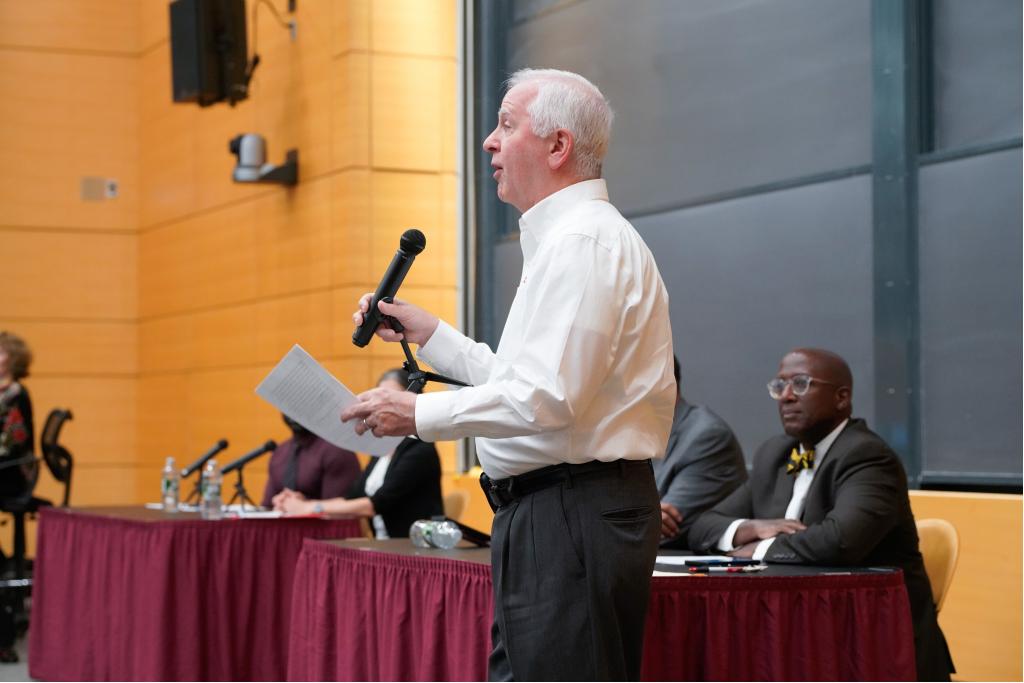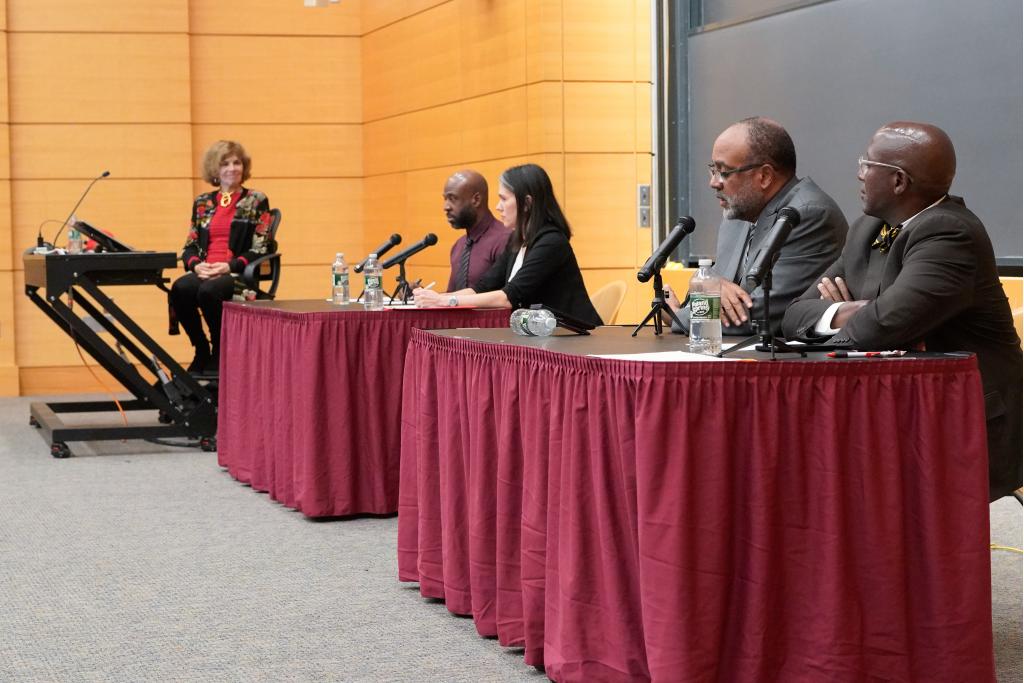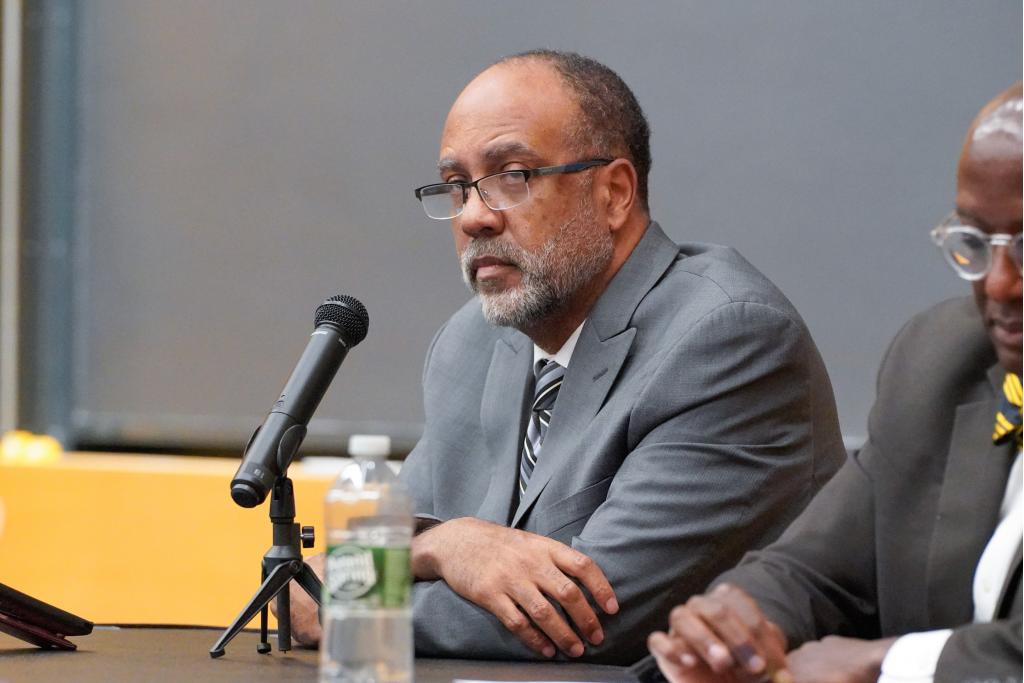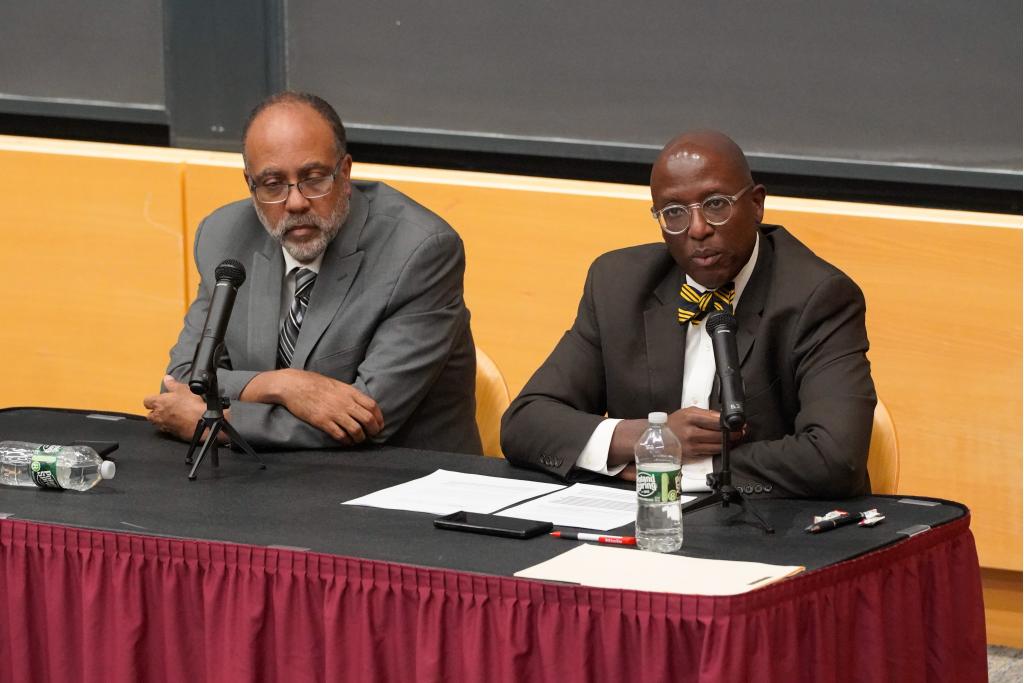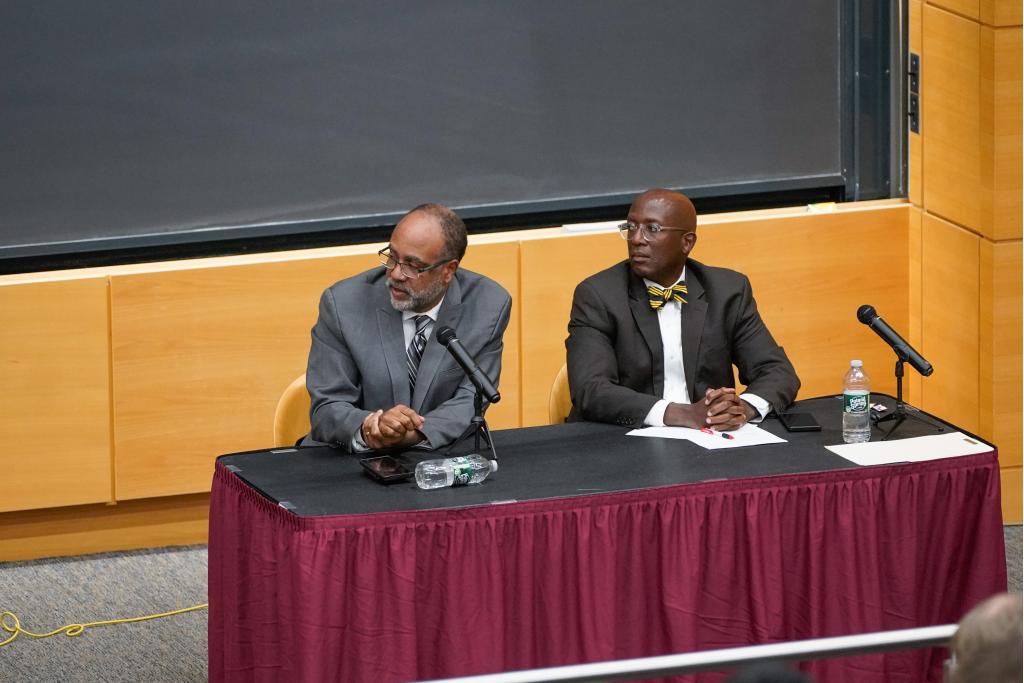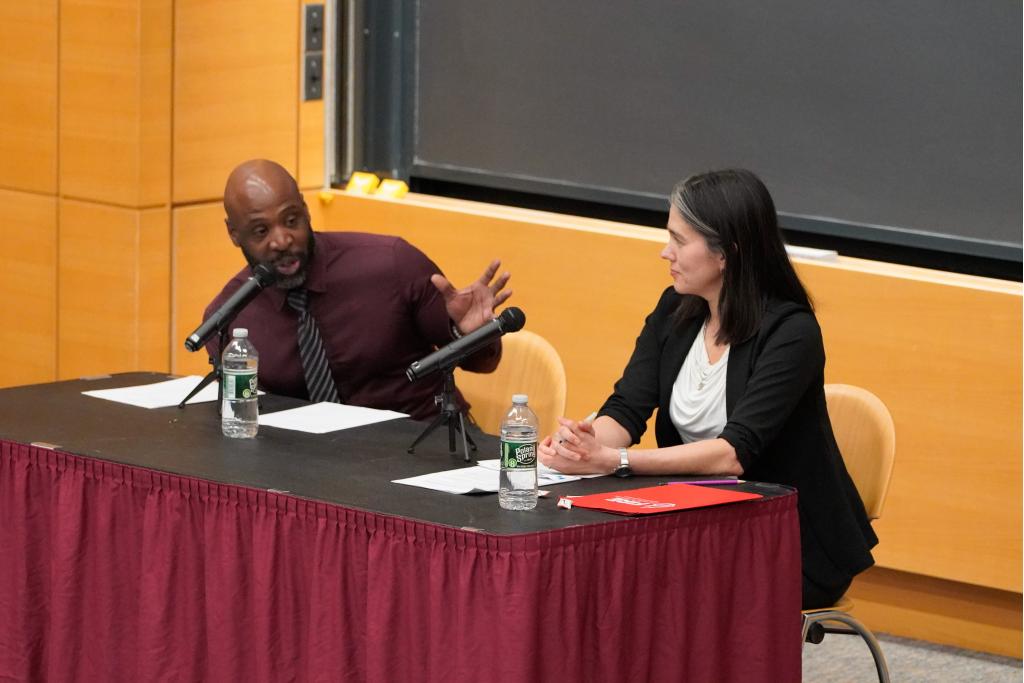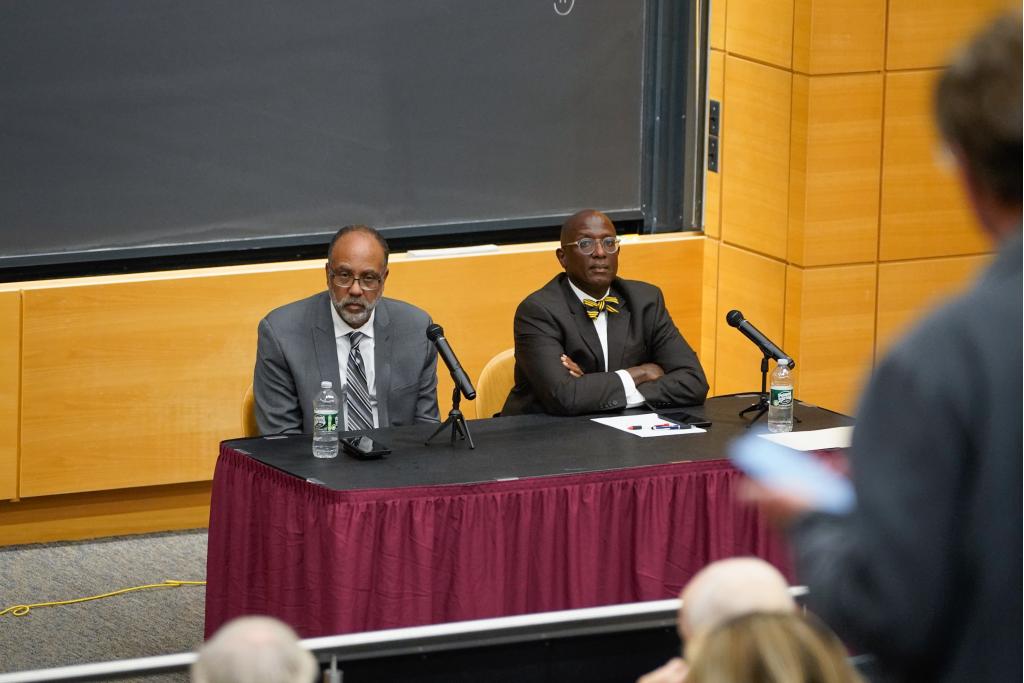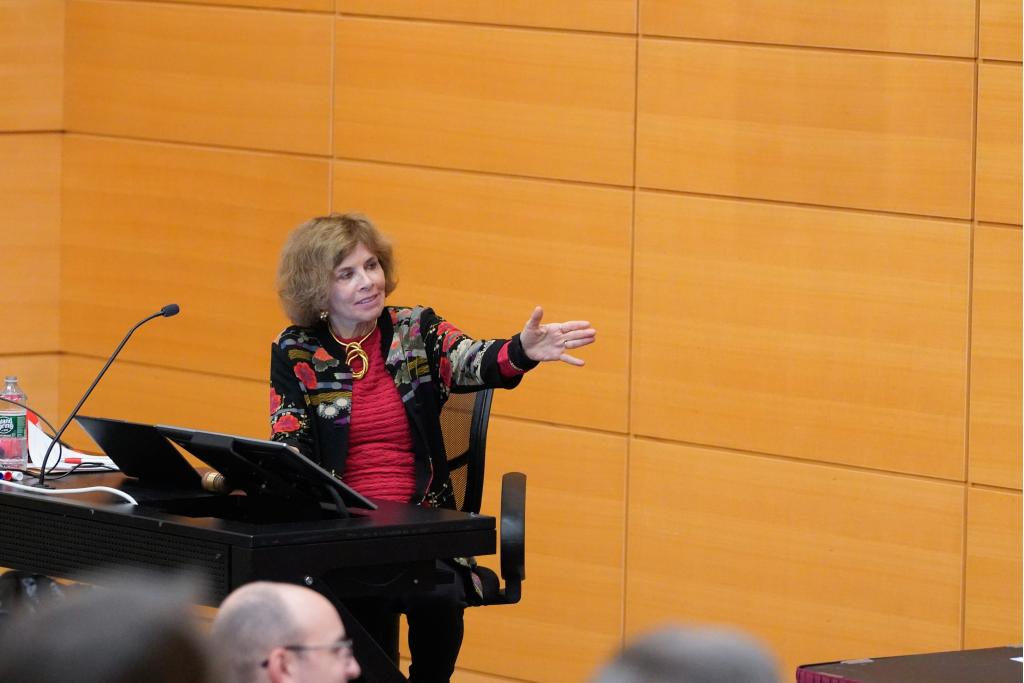Fall 2023 Debate: Is STEM Systemically Racist?
Debate: Is STEM Systemically Racist?
November 2, 2023
Following in the footsteps of our successful debate on campus DEI issues in Spring 2023, the MIT Free Speech Alliance was delighted to host, alongside the Adam Smith Society, the second in our series of campus debates, on a topic that cuts to the heart of STEM institutions like MIT: Is STEM systemically racist? the debate was held on November 2 in MIT's Wong Auditorium.
We were delighted to present a debate that tackled this difficult question head-on, with a select group of respected scholars and STEM practitioners participating. Arguing in support of the resolution, "Resolved that STEM is Systemically Racist," were Dr. Chad Womack, Vice President of National STEM Programs at the United Negro College Fund and guest editor of a series of special issues in Nature on racism in science, and Dr. Jaret Riddick, Senior Fellow at the Center for Security and Emerging Technology at Georgetown University. Arguing against the Resolution were Professor Luana Maroja, Professor of Biology and Chair of the Biochemistry & Molecular Biology Program at Williams College, and Professor Erec Smith, Associate Professor of Rhetoric at York College of Pennsylvania and President and Co-founder of Free Black Thought.
Reprising her role as debate moderator was Nadine Strossen, Senior Fellow at the Foundation for Individual Rights and Expression, New York Law School Professor Emerita, and Past President of the American Civil Liberties Union.
The debate was cordial throughout despite the differences between the sides. As The College Fix reported:
Riddick and Womack pointed to disparities between the percentage of the population composed by minorities and their representation among leaders in the STEM field.
Womack observed that only 2 percent of tenure-track STEM faculty in the United States are African-American, and attempted to tie this to discrimination that persists in American society.
This was countered by Maroja, who pointed out that representation of minorities in STEM is consistent with the level of academic achievement in these groups.
Do you know any qualified Black scientist today who, simply because of discrimination, could not enter STEM, Maroja asked the opposing panelists.
Smith also resisted claims of systemic racism against minorities in STEM, arguing systemic racism probably isn’t the monster we think it is, if it’s anything at all.
On one point, the panelists seemed to be in agreement: one thing STEM does not need is a reduction in standards of rigor:
I don’t endorse any relaxing of standards and I agree with Dr. Smith that it’s not necessary, Riddick said. However, what we see in the system is that we’re not getting where we need to be.
Prof. Maroja later posted the text of her opening comments and her retrospective view of the debate on Substack.
Watch the debate recording below or on MFSA's YouTube page.
Debate Participants
Dr. Chad Womack serves as the Vice President of National STEM Programs and Tech Initiatives at UNCF where he manages a portfolio of STEM programs that include the Annual Silicon Valley HBCU Tech Innovation Summit, STEM Scholars Program, HBCU CS/Tech Pathways Initiative, TechVentures and the Ernest E. Just Life Science Initiative. Dr. Womack is also the Founding Managing Director of the Applied Research Institute for Mathematics and Computational Sciences (or ARI) established as a collaborative platform to support and network HBCU faculty conducting research in Artificial Intelligence/Machine Learning, Cybersecurity, Data Science, and other areas. Dr. Womack’s scientific background and training includes CSO of 3gen Vaccines – a nanobiotechnology company, and several postdoctoral research fellowships at the National Institutes of Health and the Harvard AIDS Institute. Dr. Womack earned his Ph.D. in Biomedical Sciences from the Morehouse School of Medicine and is a proud graduate of Morehouse College.
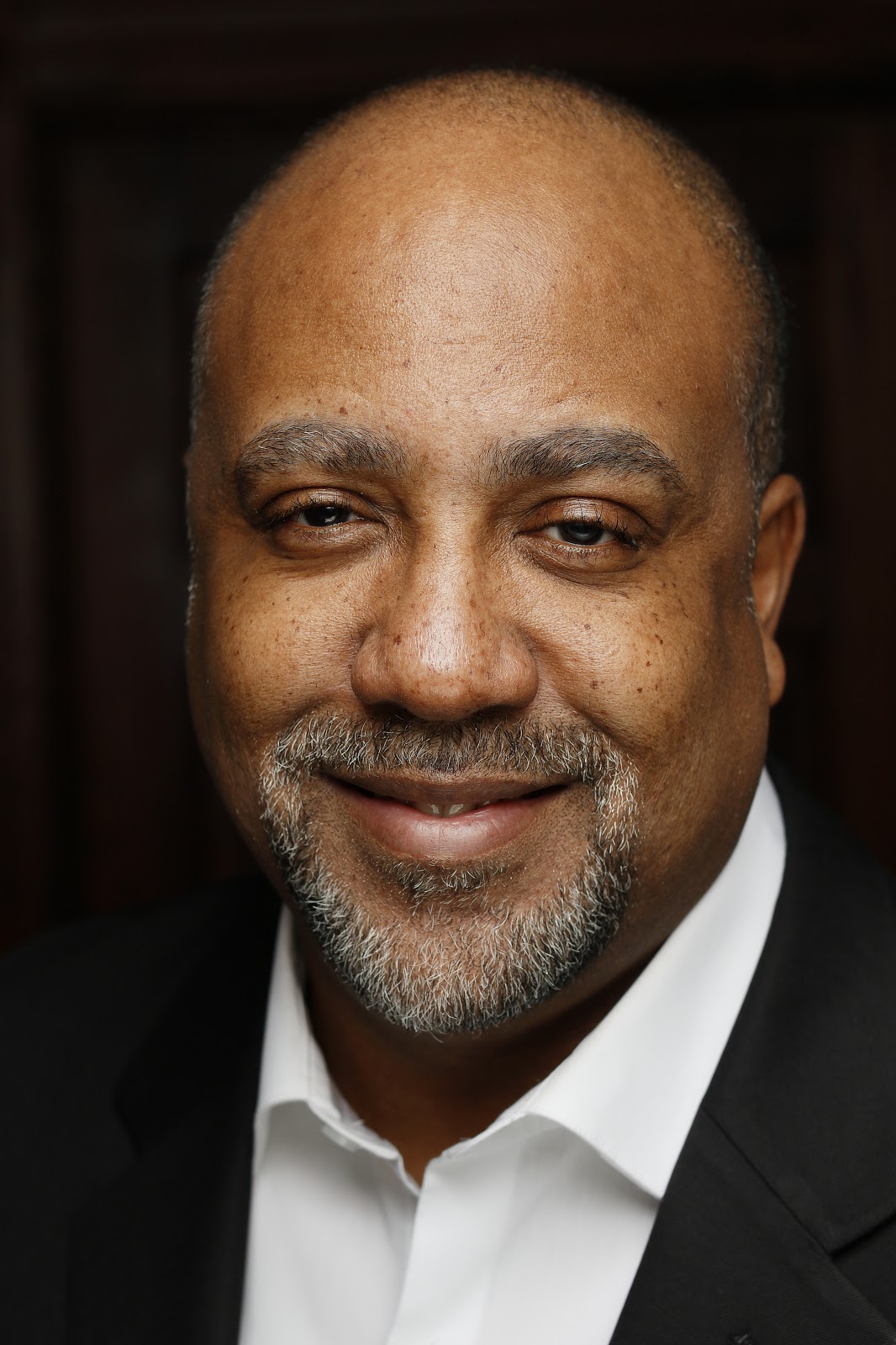
Dr. Jaret C. Riddick is a Senior Fellow at Georgetown University’s Center for Security and Emerging Technology (CSET). Prior to joining CSET, he was the Principal Director for Autonomy in the Office of the Under Secretary for Research and Engineering (OUSD(R&E)), serving as the Senior DOD official for coordination, strategy, and transition of Autonomy research and development. Prior to OUSD(R&E), Jaret served in executive leadership roles in the US Army Research Laboratory (ARL), where he established a 200-acre robotics research collaboration campus and led ARL Senior leadership efforts to establish the research competencies of the Laboratory. He has also served in leadership roles in the Office of the Deputy Assistant Secretary of the Army for Research and Technology, and the former Office of the Under Secretary of Defense for Acquisition, Technology and Logistics. He holds a Ph.D. in Engineering Mechanics from Virginia Tech, M.S. in Mechanical Engineering from North Carolina A&T State University, and B.S. in Mechanical Engineering from Howard University.
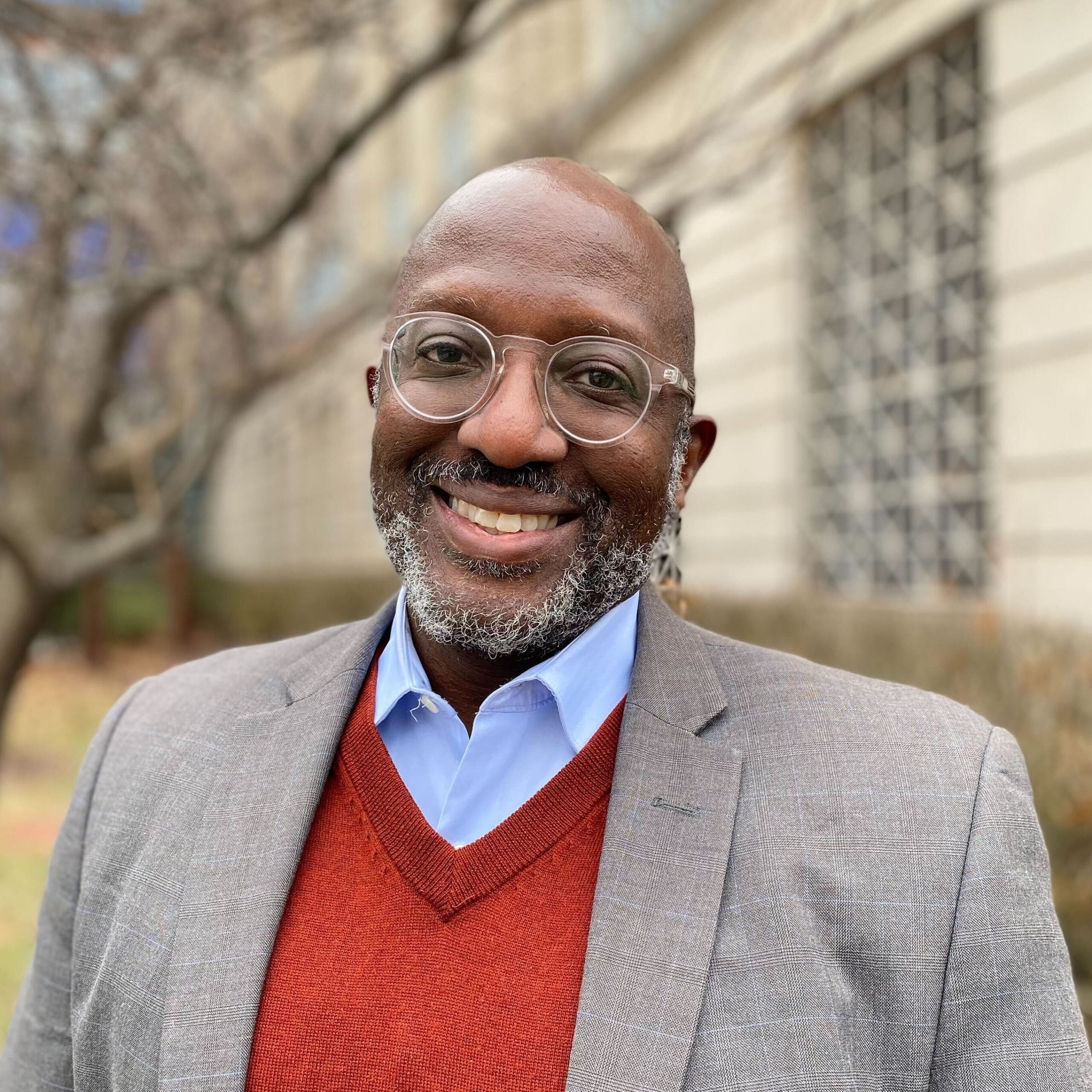
Dr. Luana S. Maroja is an evolutionary biologist and professor at Williams College. She got her undergraduate and master's degree from the Federal University of Rio de Janeiro, Brazil, and her PhD from Cornell University. Her research focuses on population genetics and speciation on a variety of organisms, including small mammals, crickets, butterflies, and plants. She and has done extensive field work in Brazil, Panama, and the USA. Maroja was born and raised during dictatorship in Brazil and was shocked to find support for restrictions in speech among USA college students. She is thrilled to see an increase in civil conversation around controversial topics.

Dr. Erec Smith is an Associate Professor of Rhetoric at York College of Pennsylvania. Although he has eclectic scholarly interests, Smith’s primary work focuses on the rhetorics of anti-racist activism, theory, and pedagogy. He is a co-founder of Free Black Thought, a website dedicated to highlighting viewpoint diversity within the African American population. Smith’s recent writings include several op-eds as well as his books, A Critique of Anti-Racism in Rhetoric and Composition: The Semblance of Empowerment (2020) and The Lure of Disempowerment: Reclaiming Agency in the Age of CRT (2022). Lastly, Smith is a research fellow for the Cato Institute focusing on politics and society.
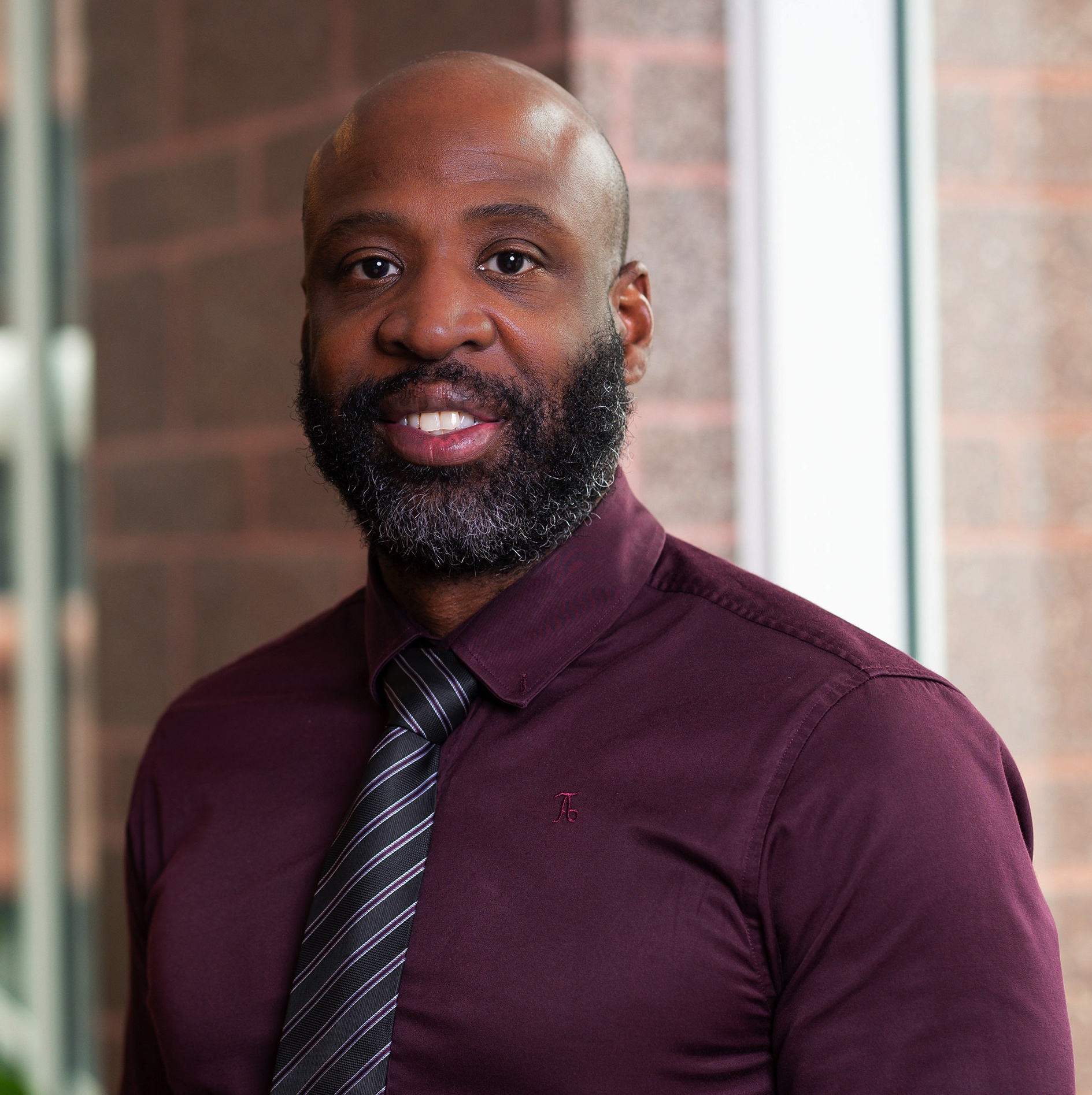
Nadine Strossen, New York Law School Professor Emerita, and Senior Fellow at FIRE (the Foundation for Individual Rights and Expression), was national President of the American Civil Liberties Union from 1991 to 2008. An internationally acclaimed free speech scholar and advocate, who regularly addresses diverse audiences and provides media commentary around the world, Strossen is also the Host and Project Consultant for Free To Speak, a 3-hour documentary film series distributed on public television in 2023. Her books about free speech include Free Speech: What Everyone Needs to Know® (2023); HATE: Why We Should Resist It with Free Speech, Not Censorship (2018); and Defending Pornography: Free Speech, Sex, and the Fight for Women’s Rights (1995), which will be republished with a new Preface in 2024 as part of the NYU Classics Series. In 2023, Strossen received the National Coalition Against Censorship’s Judy Blume Lifetime Achievement Award for Free Speech.

Debate Co-Sponsors
The debate organizers thank the more than 20 organizations co-sponsoring our debate:
- Academic Freedom Alliance
- Alumni Free Speech Alliance
- Alumni & Donors Unite
- American Council of Trustees and Alumni
- Arizona Strategies
- Bech-Loughlin First Amendment Center, University of Texas at Austin School of Law
- Boston University Free Speech Alliance
- Braver Angels
- Cornell Free Speech Alliance
- David Network
- Foundation Against Intolerance & Racism
- Foundation for Individual Rights and Expression
- Free to Choose Network
- Harvard Alumni for Free Speech
- Heresy Press
- Heterodox Academy
- Initiative on Freedom of Thought, Inquiry, and Expression at the James Madison Program, Princeton University
- Institute for Humane Studies
- Institute for Liberal Values
- John Jay Society at Columbia University
- MIT Students for Open Inquiry
- National Association of Scholars
- Phi Beta Kappa at Williams College
- Plebity
- UNC Alumni Free Speech Alliance
Debate Transcript:
A Note on the Transcript: This text was generated by an automated transcription service from the video recording of the live event. While it has been formatted for readability, it may not be a perfect representation of the spoken word and could include transcription errors. For critical reference, we recommend consulting the original video recording.
[0:09] Wayne Stargart: I'm sorry for the delayed start. For those of you on YouTube, we had some audiovisual, uh, difficulties, but we're now solved. Uh, my name is Wayne Stargart, I'm the president of the MIT Free Speech Alliance. The MIT Free Speech Alliance is an independent organization from the Massachusetts Institute of Technology that is led by its alumni, and we are a co-sponsor for this event this evening.
Now, I'm actually standing in tonight for J.R. Scott, who is the co-president of the MIT chapter of the Adam Smith Society, and they are the lead sponsor for this event. So on behalf of J.R. and the Adam Smith Society, I want to welcome you to this evening's debate.
[1:05] Now, the proposition to be debated this evening, which our moderator will repeat, is Resolved: STEM is systemically racist. I welcome all of you who have joined us today, uh, this evening in person, and I welcome all of those who are attending virtually, since we are live-streaming this event on the MIT Free Speech Alliance YouTube channel. There'll also be a recording of this debate available later.
Now, before introducing our moderator, I want to thank a few organizations and individuals whose contribution made this evening possible. First, I want to thank our 24 other co-sponsors... I also want to thank some particular people of the MIT Free Speech Alliance, specifically our secretary Bill Frezza and our executive director Peter Bonilla, as well as several other officers and volunteers who worked hard to make this come together this evening.
[2:15] Now, it's my honor to introduce our moderator for the debate, Nadine Strossen. Professor Strossen is the former president of the American Civil Liberties Union. She's a professor emerita at New York Law School, and she's a senior fellow at the Foundation for Individual Rights and Expression. She's issued two books this year: earlier, HATE: Why We Should Resist It with Free Speech, Not Censorship, and most recently, Free Speech: What Everyone Should Know. She's also the host and project consultant for Free to Speak, which is a three-hour documentary film series that was released just last month... Please join me in giving an enthusiastic welcome to Professor Strossen, who will introduce our debaters and go over the format.
[3:19] Nadine Strossen: Thank you for that kind introduction, Wayne, and thanks for all of your work to promote free speech at MIT and Beyond. Uh, before I introduce tonight's distinguished debaters, I wanted to briefly highlight the importance of tonight's debate. Uh, the debate resolution raises issues of urgent concern. As Wayne said, I will repeat it now: Resolved that STEM is systemically racist.
Despite the importance of this topic, or perhaps because of its importance, some people have argued that it is an issue that should not be subject to debate, that the debate itself causes harm. Moreover, polls show that many people do not dare to discuss this topic or other topics about racial justice for fear of being accused of causing harm... Just last month, FIRE and College Pulse issued the most recent of several annual surveys of the free speech climate... and one of the distressing, uh, answers was that about 40% of respondents—college students on 248 campuses around the country, including MIT—uh, said that they cannot have frank and candid conversations on their campuses about the most important issues of the day, including issues about race such as tonight's topic.
So solely by participating in this debate, we participants all agree on one major overarching point... we agree that these issues are not beyond debate. And so I'm going to use my favorite prop here. It's not what you think. It declares, "We all want to Make John Stewart Mill Great Again," uh, by demonstrating what he powerfully explained in his great essay On Liberty to be the benefits of questioning and debating even our most cherished ideas.
[6:39] Now I'm going to very briefly introduce our distinguished debaters. Uh, for more information about their impressive accomplishments, please see the website of the MIT Free Speech Alliance.
Our two affirmative team members, in the order in which they will speak, are first, Dr. Chad Womack, who is Vice President of National STEM Programs at the United Negro College Fund and guest editor of a series of special issues in the journal Nature on racism and science. Second, Dr. Jared Riddick, senior fellow at the Center for Security and Emerging Technology at Georgetown University and formerly the Principal Director for Autonomy in the Office of the Secretary of Defense.
Now for our negative team: first, Dr. Luana Maroja, professor of biology and chair of the Biochemistry and Molecular Biology program at Williams College. And second, Dr. Eric Smith, associate professor of rhetoric at York College of Pennsylvania and president and co-founder of Free Black Thought.
[8:03] Now, I will outline the debate format. Each speaker is going to have an 8-minute opening statement, alternating between the affirmative and negative teams. Each opening statement will be immediately followed by two minutes of cross-examination... Then each team will have five minutes for rebuttal... And finally, we'll turn to audience questions. So now that we understand the ground rules, it's time for our first opening statement from affirmative team speaker number one, Dr. Chad Womack.
[9:03] Dr. Chad Womack: Well, first of all, thank you, uh, Nadine... I want to also offer a disclaimer. Um, the perspectives I'm going to, uh, share and the ideas and views that I will articulate are my own and not my employer, the UNCF.
I will first start, uh, by sharing with you, um, a little bit about the places and spaces, uh, I have been that have, uh, informed and shaped my own thinking... on the topic at hand, which is whether STEM is systemically racist... I'm a very proud graduate of Morehouse College and Morehouse School of Medicine in Atlanta, Harvard School of Public Health... and completed postdoctoral training at the National Institutes of Health.
First, I want to define our terms. And when we think about STEM, what are we really saying? STEM is an acronym that stands, of course, for science, technology, engineering, and math... Secondly, uh, what do we mean when we say "systemic?" Of course, the root of that word is "system," which can be defined as an integrated set of interconnected components or parts that together produce some result or outcome... "Racist"... the root of that word, of course, is "racism." Racism is functionally defined as prejudgment based on race or ethnicity that is empowered in such a way that it influences the results and outcomes of a system, often to the detriment of a particular group.
And so here's where I would like to segue to my main point or thesis about STEM being systemically racist, because it is a system that is organized and a system whose structure has, um, barriers that are embedded throughout. While those barriers can be physical, um, those barriers are often intangible or cultural that are just as difficult to navigate around... The "S" in STEM is not some abstraction of society, but rather an organ and function of human society... The scientific enterprise is impacted by belief, attitudes, social mores, and yes, even prejudices that come with the human condition, and that includes racism.
So what's the evidence that, uh, STEM is systemically racist? When we look at the actual data of the results or the performance of the system from a human capital or talent development production standpoint, we see the impact of structural barriers and cultural barriers, uh, throughout at all levels... When we look across the, uh, landscape across academia, African Americans represent 2%, or somewhere around 2 to 3%, of tenured or tenure-track faculty. Certainly in the life sciences, that's the case. So when we look down from, uh, tenure-track faculty members through postdoc and then graduate programs, we see that it's not for lack of production of talent, but that there are barriers that prevent the talent from experiencing what they have been trained for... So the evidence supports the notion that STEM is systemically racist.
[16:37] Dr. Luana Maroja: (cross-examination) So you mentioned that science includes human thought and behavior, and therefore it comes with all that humans have, which includes racism. So do you consider that racism is an intrinsic part of humans, and if so, are all institutions racist?
Dr. Chad Womack: It's a brilliant question... Do... I believe that racism is an intrinsic part of human nature? I would say that we are tribal in how we organize our societies... And while tribal... can be a positive thing... it can also have a negative side to it, which I believe to be racism. But I want to be clear... racism is not prejudice. Prejudice is something that, yes, I think is intrinsic... but the power to impose that is racism. And so the extent to which, uh, racism is intrinsic systemically is really a function of a difference in power between groups within that system.
[18:12] Dr. Luana Maroja: (opening statement) Thank you for starting with definition... What do we mean by systemic racism? Systemic racism must be more than a few racists. It must be either rules codified to exclude minorities or at least a general atmosphere of discrimination shared by others but not codified or made explicit.
Is STEM... trickier to define? Are we talking about individual researchers? Are we talking about our research institutions?... Or are we talking about the scientific method itself? There is no argument that the scientific toolkit of investigation... cannot by itself be racist... Science is self-correcting, and the racist science from the past—think, for example, of racial hierarchies—is now considered a joke. Science aims to see the world as it is, and this goal cannot be racist.
Clearly individual researchers can be racist, but that doesn't seem to be what people mean by systemic... In my many years participating in science in various countries, I have never observed this. And in fact, nowadays it's easier to be hired as a woman than as a man... If there is any system in place today, it is the DEI system, which enforces norms of anti-racism and openly demands preference for people of color.
There is absolutely no question that racism was prevalent in the recent past... There should also be no questions that times have changed dramatically since the 60s and science is now much more open to those who can prove themselves meritorious. The racists and sexists that still exist in Academia have almost no power...
There is also no questions that we have a huge underrepresentation of Blacks and Latinos in science... At first, these numbers do look like proof of racism... but the inequities can be explained by lots of factors that might not involve either racism or sexism... According to the National Assessment of Education Progress, in 2022, only 8% of Black pupils in 12th grade were proficient in math... In contrast, 32% of Whites and 52% of Asians fell into the proficient category... It is thus clear that the pipeline problem starts long before individuals decide to enter STEM. Its cause is not a result of systemic racism in science, but differences in proficiency that may begin even before they end elementary school.
[26:08] Dr. Chad Womack: (cross-examination) What would account for, um, the increasing disparity as you move from high school through training... all the way through to where you are as a, uh, tenured faculty member, if it's not the structural barriers? Then what would account for those differences?
Dr. Luana Maroja: I think that the main difference could be, um, cultural differences. I come from Brazil, for example, where, um, we have a very, very corrupt, um, system... and the value for education, the value placed in education, is very different than the value placed in education here... I think you starting there with culture, you know, we have to evaluate... for example, funding for schools was a major barrier in the past. This is coming down, and in states nowadays... schools with more Blacks are better funded than schools with more Whites within states.
[27:57] Dr. Jared Riddick: (opening statement) When I first received this call to join this debate, I greeted the invitation with pause... since the summer of '20... the climate has shifted from 2020, where leaders openly declared a desire to have a conversation on race, to today, where, uh, discourse around race has been replaced with discord and a frenzy of divisive policy... But when I surveyed the facts, the data, and the evidence surrounding this question, my conclusion is that no one entrusted with a position of leadership in the field of STEM can keep silent. There's too much at stake for the future of the nation.
This debate tonight is not happening in a vacuum. Just yesterday, I heard, uh, Dr. Stacey Dixon, the Principal Deputy of the Director of National, uh, Intelligence talk about the fact that we are in a Sputnik moment. We face at this moment the greatest strategic challenge of our lifetime in the form of today's emerging great power competition... and it is clear that the great power competition is shaping up to be a race for technological dominance.
Technological leadership is a national security requirement... an essential element of this competition is STEM talent... China, uh, vastly outproduces the US in STEM, uh, college graduates... So the words that Harry Truman spoke 70 years ago... are more true today than ever when he said, "Talent and genius have no boundaries of race or nationality or creed, and the United States needs the imagination, the energy, and the skills of every single one of its citizens."
I am not basing this discourse on what, uh, my colleague Dr. Smith refers to as "the primacy of identity"... Rather, I am considering racism as an "ism," where the suffix "ism" is used to form nouns denoting a system of principles or ideals... related to assigning agency or power or authority, uh, to groups based on race.
Consider this 2022 groundbreaking study... published in PNAS. They looked at 110,000 students at six research, uh, institutions... It was found that white male students who had a D or an F or withdrawal in their intro STEM courses were just as likely to graduate as Black students, uh, who did not have withdrawals or a D or F.
[36:24] Dr. Eric Smith: (cross-examination) Can you explain or elaborate further on why what you just mentioned regarding, uh, the, um, unfortunate events in the 1960s aren't a genetic fallacy? Um, what I'm asking really is, what does that have to do with 2023?
Dr. Jared Riddick: A system may evolve over time, but a system that was designed explicitly in 1960 to keep people out, those vestiges remain in the system. Anyone familiar with system design knows even though we may change how we use the system, that does not mean that the system, um, will produce the outputs that it was not designed to produce... This system that we have is characteristically incapable of producing talent from underrepresented groups at the scale that we need... and that characteristic incapability around racial lines is the very definition of systemic racism.
[37:57] Dr. Eric Smith: (opening statement) The absurdity of some of those solutions says a lot about the efficacy of systemic racism. First, Equitable Math, based on the anti-racist theory of Tema Okun, insists that Black students who don't do well in math are failing because they are being taught the "white way," not the "right way."... Then we have Citational Justice, which compels people to make sure their "works cited" page is diverse... Not citing a person of color is considered inherently racist... Then we have Epistemic Justice, which really talks about the legitimacy of... lived experience and how lived experience is just as valid as scientific experience.
I'm trying to be nice here, but it's hard to do that. And I think it's hard to do that because this is inherently insulting to Black scholars... These things basically tell people that Black people are inherently inferior and unable to work at the same level as white students. That has nothing to do with anything based in reality... The absurdity of them strongly suggests that systemic racism either isn't a thing or isn't nearly as bad as it's being talked about.
Discourse can be learned. Discourse is not something that is a cultural barrier. Even white students have to learn the discourse... When I go to dinner with white people, they don't say, "Pass the sodium chloride." They say, "Pass the salt." Alright? They have to learn that as well.
If we do have systemic racism, then it's in thinking that Black kids can't do math the same way white kids can. It's in thinking that there is a prescribed way of being Black and an inauthentic way of being Black. If there is systemic racism, it's about claiming that there's some kind of specter of racism that is holding us down, instead of a disbelief, a learned helplessness.
[46:08] Dr. Jared Riddick: (cross-examination) I want to ask you about this PNAS study, right, where we have Black students and White students... prepare, they go into college, uh, the Black students outperform the white students, the white students graduate at a higher rate. What's going on there?
Dr. Eric Smith: There is a program at Stanford called the POISE program... and they did it to... acclimate people to academic or disciplinary discourse and let them understand why that discourse is there, to basically demystify the disciplinary discourse... It's working. The students are doing it themselves. This can be replicated... And if they can be replicated, then this idea of systemic racism is, well, a bit fallacious.
Dr. Jared Riddick: Well, all those things are still getting us to like 2 or 3%.
[48:39] Rebuttals
Dr. Jared Riddick (Affirmative): We have a real-world crisis in talent, and we have to grow the numbers. And the growth opportunity is in those groups that have been underrepresented... A STEM system that displays systemic racism is contributing to the loss.
Dr. Chad Womack (Affirmative): The K-12 STEM yield for African Americans in the city of Philadelphia... is 1% or less. One percent or less, which of course means that 99% are not prepared... We've got a major problem... For our own nation's sake, if we want to be the kind of society where we project out to the rest of the world that we are a shining example, then we have to do a better job.
Dr. Eric Smith (Negative): Stephen Krashen is a linguist who, um, coined the term "affective filter."... The higher the affective filter, um, the more the students do not feel respected by their professors... they feel less than... It's in the delivery, it's in how we talk to people... Acclimating people, demystifying the discourse can go a long way... Our students are being told that this world is helpless, that this discourse is inherently racist because a white person came up with it. And these ideas in themselves are the problem. If a Klansman wanted to make sure that he could hold Black people down, this systemic racism thing would be a good strategy.
Dr. Luana Maroja (Negative): If we don't find, uh, the causes that are leading to discrepancies and inequalities, we cannot find effective solution... For a while, I believed in the concept of microaggressions. And when you start to believe in microaggressions... everything becomes a microaggression. It's extremely taxing on you... So I have no questions that some of these people that failed to graduate in college is because they were bombarded with this microaggression concept... which now we teach to our TAs at my college.
[57:45] Audience Q&A
Nadine Strossen: Before we turn it over to the audience, I would like to, uh, ask the audience to join me in thanking all of our speakers. Uh, let me lay out the ground rules...
[58:23] Audience Member (Brian Paul): What institutional or systemic fixtures in your minds would need to be replaced, modified, removed somehow in order to make these types of programs more replicable, scalable?
Dr. Chad Womack: I was just remarking to my colleague... we both hail from, uh, historically Black college universities... I want to point out that while HBCUs represent only 3% of higher ed institutions in this country, they produce over 25% of STEM graduates... So HBCUs represent a scaling factor that need, uh, the resources and support, uh, that this country has yet to provide... due to systemic racism in funding.
Dr. Jared Riddick: Annually, the United States government spends $50 billion on higher education research and development. $50 billion. HBCUs... achieve 500 million out of that 50 billion... In other words, this group of 102 institutions... get one penny out of every dollar.
[1:03:22] Audience Member: I have a hypothetical question... You're on a faculty hiring committee... You have two finalists, they're both stellar, equal in every way... One of them is a White man and the other is a Black woman... If systemic racism was powerful, which would get the job? And if we live in the real world that we're in today, which would get the job?
Dr. Eric Smith: The Black woman will get the job because it's 2023. One, B, she's qualified, right? C, it's comparable, and in this day and age, diversity is a laudable goal. So let's have the Black woman.
Dr. Jared Riddick: I've hired lots and lots of people in an actual science lab. I hire the best person, always.
Dr. Chad Womack: I think your question misses the point about what systemic racism actually is... The problem... is usually that the Black male or Black female is not even in the room because they didn't know about the position. Most academic positions are filled before they're even posted... There was an article published in Science which was a brilliant analysis about who hires whom and from where... It's a set of maybe eight schools that hire faculty from the other seven. And so that incestuous nature of academia is part of the problem.
[1:10:04] Audience Member: Why have we, in the name of equity, pushed people and requirements down in trying to lift more people up?
Dr. Jared Riddick: I've said more than once that the goal should be... to grow numbers but also maintain very high quality... High numbers and high quality is where we need to go, and I think that anything that is, uh, moving in opposition to that is also contributing to the loss.
Dr. Eric Smith: What you describe, sir, is what I think if anything is systemic racism. Instead of empowering these students, we get rid of AP classes, we instill Equitable Math, um, in which getting the right answer isn't that big of a deal, right? Because they're Black. The solutions are more racist than the apparent racism.
[1:18:20] Audience Member: The affirmative team noted the Chinese are out-graduating us in STEM, but then we focus only on the American community... If STEM's universal, then wouldn't that effectively take out your argument that STEM is systemically racist?
Dr. Jared Riddick: No... The overperformance of certain groups does not prove that the STEM system is, uh, not incapable of bringing at scale from underrepresented groups... The number that I talked about for, uh, PhDs... if you take the foreign-born out of that US PhD number, uh, then we're outpaced three times by China. Right? And so... why would we not go after talent that is onshore here?
[1:23:00] Audience Member: I'm concerned about the advice given to young Black men and women... What about advice... that while you're busy trying to change... structural racism, they pretend that it doesn't exist? They push on because the alternative... is suicide for them, and I mean scientific suicide.
Dr. Chad Womack: Racism for African Americans in this country is real... but what you describe is actually a conversation that most Black parents have with their kids... The challenge is that when you ask young folks to just push on despite the structural barriers... without a strategy and a plan... it becomes an issue of fractions... The question is, how do we convert denominators into numerators?
Dr. Eric Smith: I also think that our students are being talked to like it's still 1942, and it's not... We can learn that grit... and it starts with letting people know that the world isn't out there to get them. They have opportunities... We don't focus on that. We focus on all the negativity.
[1:30:11] Audience Member: How does that make the university or that STEM program racist if anything, it would be an indicative of disparities that exist downstream before... university education even started?
Dr. Jared Riddick: This is the exact reason why I focused on kids who are in the program, right? Who have the qualifications, who outperform, um, their counterparts of other races but graduate at a lower rate. Those lost students in that group are the ones that I'm saying represent a deficit for us... This one statistic is so indicting, and I haven't heard anyone deal with it at all.
Dr. Eric Smith: So I'll deal with it... How do you know it's because of racism?... How do you know that the reason why they're not graduating... is because of racism and not because of something else?
Dr. Chad Womack: In the individual case, you don't... However, when you step back and you zoom out, you start to see patterns... All things are equal, and if you're looking at differential outcomes at a large scale, you're talking about patterns that are reproducible... That's how you know.
[1:37:18] Nadine Strossen: The hour is getting very late, but I think there was at least one more question... What I would respectfully suggest is that we take three questions in a row, and then, uh, have shorter answers...
[1:37:45] Audience Member: This question's for, uh, Dr. Riddick... I was curious if you could talk about the, uh, what you thought the causal mechanisms in the classroom, labs, or university administration were that were causing those outcomes [in the PNAS study]?
[1:38:42] Audience Member: I read about a, uh, chemistry professor at NYU who was fired because his tests were too hard... Are we at risk... of moving people into fields that aren't properly prepared because there's a feeling among students, and students have more power now... Is that a problem?
[1:48:33] Audience Member: We've heard a lot of arguments, uh, to me that all of them seem to be very statistics-based... I wonder if, uh, both teams could think/propose some sort of an, uh, experiment—thought experiment or real experiment—that could be run to determine what the underlying cause is.
[1:49:39] Audience Member: My question to both teams is, is whether SAT tests are systemically racist?
[1:49:51] Nadine Strossen: I forget the first question...
Dr. Eric Smith: I, with all due respect, I don't think what we've been talking about on this side of the panel is a distraction. I think it's part an important and imperative part of the issue... You can fund people until they're swimming in money, but if they have an attitude that none of that matters because they're Black—and they are being told that—that is an issue.
Dr. Luana Maroja: So the dropping of the SAT, I see very much like, uh, the dropping—the increasing grades and everything else. You want to solve inequalities by simply removing the test because then you can't see anymore... All these things are happening all over the country... and they're not helping. We are searching for wrong solutions because we have the wrong problem, the wrong conclusions.
Dr. Chad Womack: Any psychometric assessment like an SAT has to ask and answer a basic question: what are you measuring? And if what you're measuring is not, uh, consistent with the learning objectives and outcomes... then the question is, is it a proxy or is it actually measuring something substantive?... I do think that the majority of our kids come from environments... where the parents want the best for their kids. They just don't know what to tell them because it's not resourced and they don't understand what it means to be an engineer.
Dr. Jared Riddick: I'll just say that... I hope that the use of the term "distraction" wasn't taken personal, but I think what Chad and I are getting at is that we want to be sure that we're not nibbling around the edges of the problem... There is an interesting statistic that in the existence of that [Meyerhoff] program, it produced over 100... Black kids who went on to get PhDs. And when you look in that same time period, there's no other majority institution in the United States that produced 100... but there are several HBCUs that did. And the students from HBCUs that went on to get those PhDs went to majority institutions at an 88% rate. And so right there is a prime example of things that we can look at... I would end by saying this... Where we are in terms of Fourth Industrial Revolution... gives us another option, and that's to really place these technologies at the center of these community issues.
[1:58:17] Nadine Strossen: Well, thank you all for wonderful debaters and many, many thanks to the terrific audience for your great questions and for your attentiveness. Thank you. (Applause)
